How to Reduce, Reuse, and Recycle
A Practical Guide for Georgia
About Recycling in Georgia
Recycling is the process of collecting and processing materials that would otherwise be thrown away as trash and remanufacturing them into new products. Increased recycling can reduce greenhouse gas emissions because recycling existing materials is often less energy-intensive than creating new materials.

Why Should You Reduce, Reuse, and Recycle in Georgia?
Find out how recycling can reduce emissions as well as benefit the environment and the economy in our state.

What Is Waste? Can We Think About It Differently?
Learn about what happens to trash and recycling after it gets picked up, and how you can think about waste in a new way.

How Can You Recycle The Right Way in Georgia?
Recycling guidelines can vary from place to place. These tips will ensure the items in your blue bin are recycled properly.

What Items Are Accepted for Recycling in Georgia?
We can help you sort out which materials are accepted for curbside recycling, as well as what to do with hard-to-recycle materials.

How Can You Reuse More So You Can Waste Less?
Increasing the amount you recycle isn’t the only way to reduce waste. Get inspired by these tips for reusing common items.

How Can You Reduce Household Waste in Georgia?
Modern life produces an unsustainable amount of waste. These tips can help you reduce yours in ways both large and small.

What Are Some of the Challenges to Recycling?
Recycling isn’t always easy. Find out more about what challenges some communities face when it comes to recycling.

How Can You Make a Local Impact on Recycling?
If you want to increase recycling in your workplace or your community, these tips and resources can help you get involved.

Glossary of Terms: A Guide to Recycling Vocabulary
E-Waste, freecycling, upcycling, and wishcycling - learn what these words mean, along with other common recycling terms.

Resources: Learn More About Recycling in Georgia
Interested in learning more? There are many great resources about recycling in Georgia that you can explore.
Why Should You Reduce, Reuse, and Recycle?
Take a look around you! How are things made? Where are they going? Learning about how you can reduce your consumption, reuse items, and recycle materials back into use in new products is not only great for the environment--it’s also good for Georgia’s economy and even for you as you start to rethink and reshape how you see all the different kinds of materials around you!
How does reducing and reusing lower greenhouse gas emissions and protect the environment?
How are these actions good for the environment? They all help conserve the natural resources around us. Anytime something brand new does not have to be made, it saves energy and avoids raw materials from being extracted to create new materials. Decreasing the amount of energy and natural resources used also reduces greenhouse gas emissions. Also, responsibly disposing of materials helps keep them from polluting the natural areas surrounding our communities.
How does recycling reduce greenhouse gas emissions and benefit Georgia?
We are very much a “take, use, and then dispose of” society. This linear thinking creates a system where too many materials end up headed for the landfill, which means that more new products need to be made, which increases greenhouse gas emissions.
Instead of viewing consumption as a linear process, we should emphasize a circular way of thinking by putting materials back into the system to be reused. This kind of thinking decreases a carbon footprint by using materials that are already in the system, encourages innovation, and supports local communities. A circular economy extends the lives of materials instead of sending everything to the landfill.
Recycling is also great for Georgia’s economy! Did you know that Georgia has the second-largest infrastructure for recycling manufacturing in the country? More than 120 businesses statewide rely on recycled materials for their products. Recycling is an important industry that provides jobs around the state.
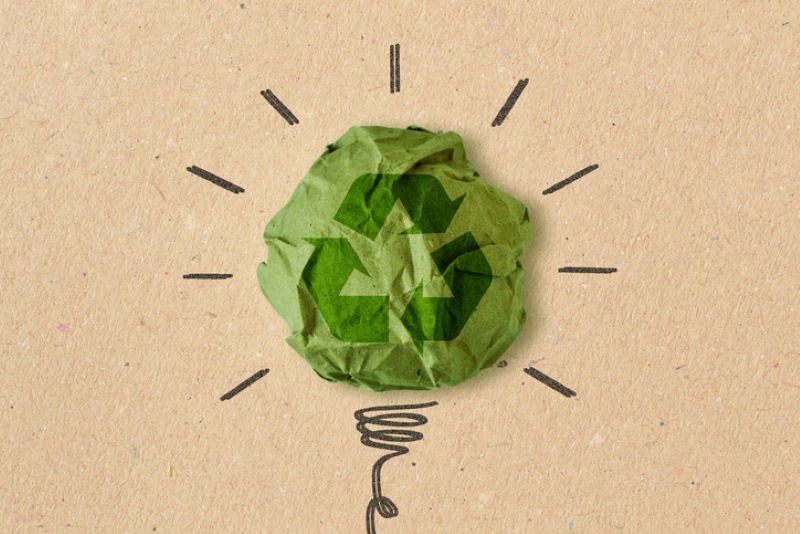
What Is Waste?
Looking at different definitions of “waste,” they tend to start with something like “damaged,” “defective,” “rejected” or “unwanted.” However, if you flip the perspective, you may notice that what you once saw as “waste” could have its life extended through various avenues.
Stopping to think about throwing things away will bring up a great question: Where is “away”? Asking yourself this question can help you see the larger picture when you think through how you can reduce, reuse, recycle, and reengineer in life. Before you throw something out, ask yourself if this item’s life can be extended through reuse or recycling. Take a look at the U.S. Environmental Protection Agency’s Sustainable Materials Standards and how actions are prioritized.
What happens to household recycling after it is collected?
Once the recycling is collected, it is either sent to a material recovery facility (MRF) or sent directly to a vendor who will process and prepare the material to be made into new items. If the materials collected are too contaminated, then the materials will be sent to the landfill.
Would you like a behind-the-scenes tour of an MRF? The Georgia Recycling Coalition has a wealth of resources to help you explore where recycled materials go in Georgia.
How to Recycle?
How do you learn about specific recycling programs, initiatives, events, or collection drives?
Always check with your local municipality for direction. You can also visit the website of your local Keep Georgia Beautiful Affiliate for guidance and local recycling events around you.
If you live in a multifamily building, it can be especially difficult to access recycling. Checking with your closest Keep Georgia Beautiful Affiliate or local municipality for local drop-off resources and nearby collection events is a great way to recycle more!
What’s the best way to sort and prepare recyclables for collection?
Be sure to always check with your local municipality for specific rules and regulations.
Across the board, best practices include:
- No food or liquids. Be sure to clean and dry your recyclables! This helps stop food or liquids from spreading to other materials and decreases the chances of contamination.
- No plastic bags. The bags can get caught in the recycling facilities’ trucks and machinery and damage them!
- Take bags and film to a separate collection facility.
- Keep your recyclables loose! Put them straight into the bin and not a bag.
- Some folks sort out materials into different bins so it’s easier to dispose of them at drop-off locations. Another helpful trick, especially with plastics, is to take a marker and write the number, or plastic resin type, in larger print so you don’t have to keep searching for the tiny chasing arrows:
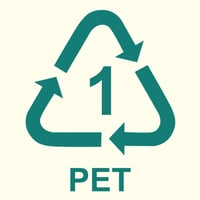 Are there recycling laws in Georgia?
Are there recycling laws in Georgia?
Always check with your local municipality for local recycling laws/policies.
Even though there are not many statewide recycling laws, we need more put in place to create change! More supportive policies can yield stronger recycling infrastructure, access, and education across the state.
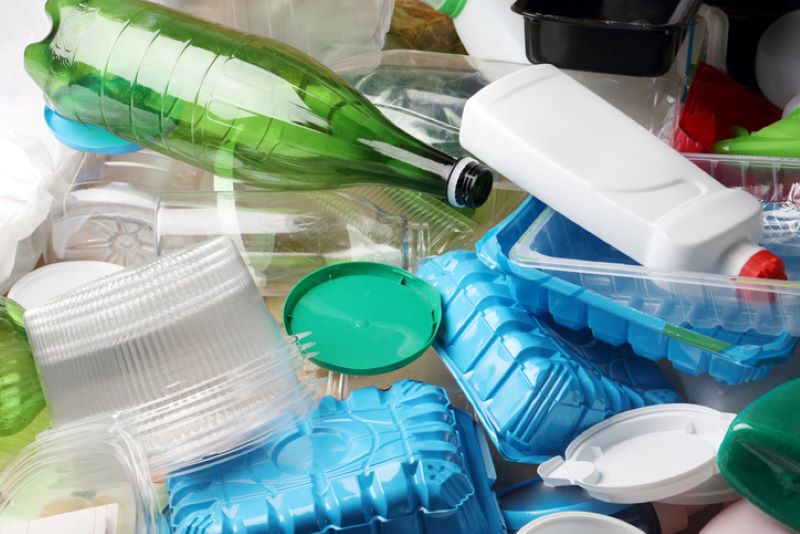
What to Recycle?
What can you recycle in Georgia? What are the easiest items to recycle?
Check with your local municipality for guidance and visit your local Keep Georgia Beautiful Affiliate’s website for local events and more local opportunities.
To make recycling a little easier, take baby steps! Start with collecting these 5 items to recycle. Make sure they are clean, dry, and loose (not in a plastic bag).
- Plastics #1 and #2
- Aluminum
- Metal
- Mixed Paper
- Corrugated Cardboard
What do the different recycling symbols mean?
The symbol with the numbers inside the chasing arrows is called a Resin Identification Code (RIC) and it identifies the type of resin that the plastic is made of and is an indicator of the recyclability of the material.
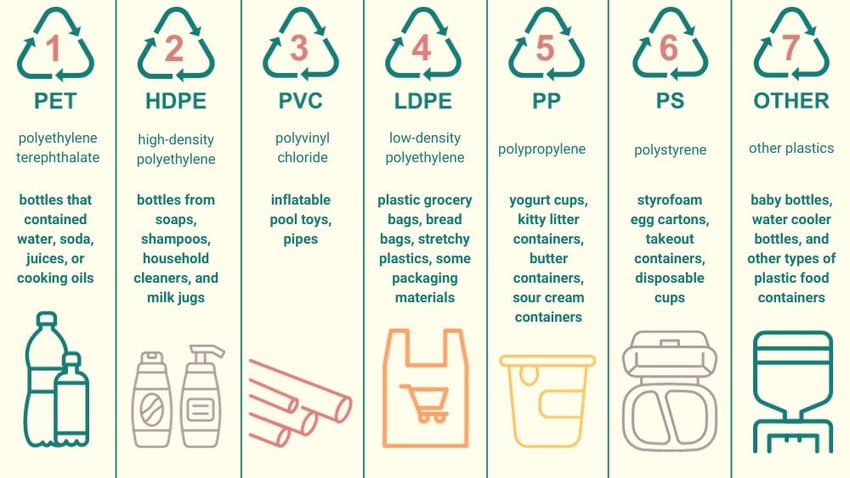
Do you need to clean what you recycle?
Yes, make sure your recyclables are clean and dry before putting them in a bin! This helps prevent contamination of other materials.
Think of a yogurt container that still has yogurt in it; when that is tossed in a bin with other items, that yogurt could then get all over your cardboard and mixed paper, which decreases their value to be recycled into new material.
A tip to make cleaning your recyclables easier: next time you do your dishes, throw those hard-to-clean recyclable items into the sink or dishwasher, too!
Does glass need special treatment for recycling?
Always check with your local municipality’s website for more information.
Check to see if the glass in question is food-grade or flat glass:
- Food-Grade: Check to see if the drop-off location needs the glass to be separated by color (clear, amber, green) or if it can all go into one bin. Examples of food-grade glass include:
- Wine bottles
- Beer bottles
- Pickle jars
- Peanut butter jars
- Condiment jars
- Baby food jars
- Soda bottles
- Flat glass (Non-food-grade): Flat glass is treated with chemicals and must be recycled separately from food-grade glass. Examples include:
- Window plate
- Glass tables
- Table inserts
- Shower door glass
- Glass panel office dividers
- Car window/windshield glass
If you are unsure about whether your local processor accepts a certain type of glass, always reach out and ask. It’s better to ask a question than possibly contaminate the recyclables.
Are paper towels recyclable?
No, paper towels are not recyclable, but they may be compostable. If you have access to a composting service, check with your provider about what they accept. Learn more in our Drawdown Georgia composting toolkit.
Also, next time try using a reusable dish or tea towel instead of using paper towels!
Does tape need to be removed from materials before recycled?
Yes, remove tape from boxes, Styrofoam, and film before recycling.
What can’t be recycled, or reused and what do you do with it?
Sometimes it can be difficult to determine how to properly dispose of a material. There are a number of reasons why something might not be able to be recycled or reused, but be sure to use all of the amazing local resources around you to determine if something is recyclable or reusable first!
Also, be sure not to “wishcycle”. When in doubt, always research if an item is accepted. When materials make it into the system that shouldn’t be there it can contaminate valuable materials, damage processing machinery and could harm a person working alongside the materials.
What can you do with hard-to-recycle items?
You might be surprised by what you can recycle when you connect to the right resources. Some general resources that can connect you to local recyclers of hard-to-recycle items include:
Below is a list of common items that can be harder to recycle, along with suggested places that accept these items. Many of these resources are focused on Atlanta and Athens. Your local municipality and the resources linked above are great ways to find processors that accept hard-to-recycle materials across Georgia!
Be sure to always double-check with the organization’s website or get in contact with them with any questions, and always check with your local municipality’s website for more information.
- Carpet and rugs; carpet padding: Some carpet manufacturers will take back used carpet for recycling, including Interface, Mohawk, and Shaw.
- Kitchen cabinets, windows, doors: Habitat ReStore; Lifecycle Building Center
- Bikes, scooters: Athens-Clarke County Center for Hard to Recycle Materials (CHaRM); Live Thrive, Inc, CHaRM also accepts bikes
- Luggage and trunks: Live Thrive, Inc, CHaRM; or donate to a local thrift store
- Paint: Athens-Clarke County Center for Hard to Recycle Materials (CHaRM); Live Thrive, Inc, CHaRM
- Hazardous Materials and Chemicals: Athens-Clarke County Center for Hard to Recycle Materials (CHaRM); Live Thrive, Inc, CHaRM
- Pallets: Athens-Clarke County Center for Hard to Recycle Materials (CHaRM)
- Christmas trees (real): Keep Georgia Beautiful - Bring One for the Chipper
- Christmas tree lights: Live Thrive, Inc, CHaRM
- Metal and scrap metal: Athens-Clarke County Center for Hard to Recycle Materials (CHaRM); Live Thrive, Inc, CHaRM
- Appliances: Athens-Clarke County Center for Hard to Recycle Materials (CHaRM); Live Thrive, Inc, CHaRM
- Furniture: Habitat ReStore; Atlanta Furniture Bank; or donate to a local thrift store
- Textiles: Athens-Clarke County Center for Hard to Recycle Materials (CHaRM); Live Thrive, Inc, CHaRM
- Plastic toys: If usable, donate to a local thrift store; if not usable, Live Thrive, Inc, CHaRM may accept them
- Aerosol cans: Live Thrive, Inc, CHaRM
- Hardback and paperback books: Athens-Clarke County Center for Hard to Recycle Materials (CHaRM); Live Thrive, Inc, CHaRM
- Car-related materials:
- Car batteries: Check local auto shops for take-back programs; Athens-Clarke County Center for Hard to Recycle Materials (CHaRM); Live Thrive, Inc, CHaRM
- Tires: Liberty Tire Recycling
- Tires without rims: Athens-Clarke County Center for Hard to Recycle Materials (CHaRM); Live Thrive, Inc, CHaRM
- Antifreeze, oil, brake fluid: Check local car shops (ex: Autozone, O'Reilly's), Live Thrive, Inc, CHaRM
- Metal: local metal scrap yard (ex: Fulton Metals Recycling)
- Food-related scraps: Athens-Clarke County Center for Hard to Recycle Materials (CHaRM); CompostNow; Goodr; Live Thrive, Inc, CHaRM
- Cooking Oil: Athens-Clarke County Center for Hard to Recycle Materials (CHaRM); Live Thrive, Inc, CHaRM
- Tin foil or aluminum foil: Athens-Clarke County Center for Hard to Recycle Materials (CHaRM); Live Thrive, Inc, CHaRM
- Yard waste: Check your local municipality’s website for more information on yard waste collection.
- N-95 respirators, face-masks: Unopened masks may be able to be donated to MedShare; reusable masks may be washed and reused.
- Tools: Atlanta Tool Bank; Live Thrive, Inc, CHaRM
- Pizza Boxes: Tear off greasy parts of the pizza box and recycle the clean cardboard. If you have access to a composting service or drop off, check with that group to see if they accept pizza boxes. If the composting option is not available, throw away the greasy part of the pizza box.
- Plastic Packaging: Athens-Clarke County Center for Hard to Recycle Materials (CHaRM); Live Thrive, Inc, CHaRM accepts stretchy plastics (to check if the material is stretchy, take a single layer of the plastic and put your thumb through it- if the material gives it is stretchy.)
- Styrofoam: Athens-Clarke County Center for Hard to Recycle Materials (CHaRM); Live Thrive, Inc, CHaRM
- Waxed Cardboard Containers: Check your local municipality, Live Thrive, Inc, CHaRM
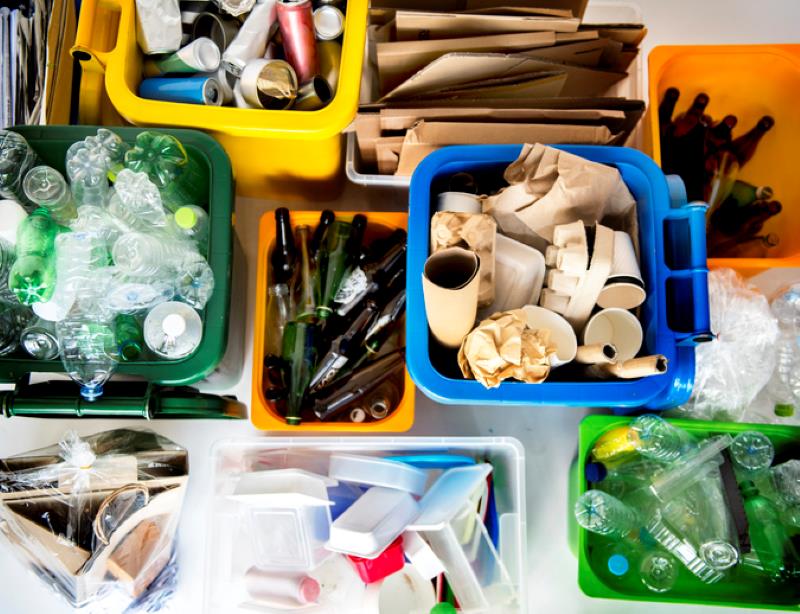
How Can You Reuse More?
What items can be reused?
Before throwing something away, recycling it, or purchasing a new item, look and see if you can reuse the material in a different way. Get creative! You might find helpful inspiration on websites like Etsy and Pinterest, and you can also check out local arts or crafting organizations for more ideas and special events or classes.
Here are a few ideas to inspire you:
- Clean out jars and use them to:
- Propagate or water plants
- Store dry goods
- Make candles
- If you get take-out food in plastic containers, reuse those containers for lunches or to give cookies to friends.
- Instead of throwing away an old t-shirt, cut it into squares and use those as rags to clean with.
- Hold onto used wrapping paper and/or gift bags and reuse them in the future.
- Reuse bags:
- Keep reusable bags handy for all types of shopping
- Give plastic bags a second use:
- Cleaning up after your pet
- Trash can liners
- Excess, edible, uneaten food- instead of throwing out food, look up local food recovery organizations like Goodr, Second Helpings, or the Freecycle Network to salvage the food
What is upcycling?
Upcycling is transforming a material into a product of higher or greater quality. The difference between recycling and upcycling is that upcycling does not break down the material. The item is still made out of the same material at the end of the process but in better quality or value. You may also hear it called creative reuse!
Want to learn more about creative reuse groups in Georgia? Check out what these groups are doing:
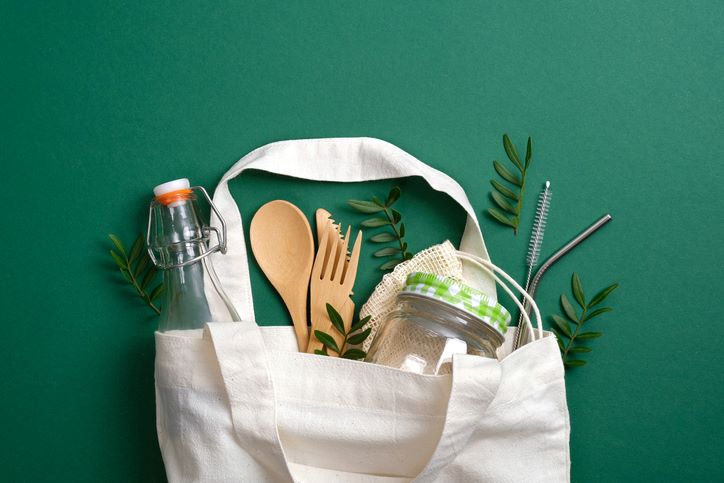
How Can You Reduce Waste?
You’re already off to a great start by asking questions and learning more! Being conscious of what waste you create helps you to work backward and see where it’s possible to reduce consumption, reuse materials to extend their life, recycle materials so they can be made into something new, and replenish the soil through composting.
How is Georgia working on waste reduction?
There are a number of incredible organizations around Georgia working on waste reduction through different avenues such as education, accessibility, composting, recycling, creative reuse, and more! Check with your local Keep Georgia Beautiful affiliate for more information about local events, coalition information, and more resources.
How can individuals reduce household waste?
Start by taking notice of what waste you create and see where you could make small changes:
- Are there any local drop-off locations around you that you could take materials to?
- If possible, opt for electronic messages instead of receiving paper mail to reduce the amount of paper used.
- Start conversations with friends and family about how we can all reduce waste in our everyday lives.
- Do you create a lot of food waste? Could meal planning help, or are there local compost collection groups that you could utilize? Learn more about composting in our Drawdown Georgia composting toolkit.
Rethink how you consume:
- Could you reuse something you have instead of buying it new?
- Check out local organizations where people trade around items for free! Ex: Freecycle Network, Buy Nothing Groups.
- Bring reusable bags- not only for grocery stores but for other stores as well.
- Avoid single-use, disposable items.
- Research brands. Watch out for greenwashing- when a company purposely deceives the consumer with misleading information to act as if the product is good for the environment when it is not.
- Look at the material an item is packaged in. Is it completely recyclable? Is there an alternative you could purchase?
How can I persuade manufacturers to use less packaging in the first place, so that there is less single-use packaging material to be recycled?
You can always use your voice and reach out to companies with concerns and feedback on products!
- Rethink what you purchase and how you purchase.
- Research brands.
- Opt out of purchasing single-use or disposable products.
- Select a different product that is made from recycled content or an easier-to-recycle material.
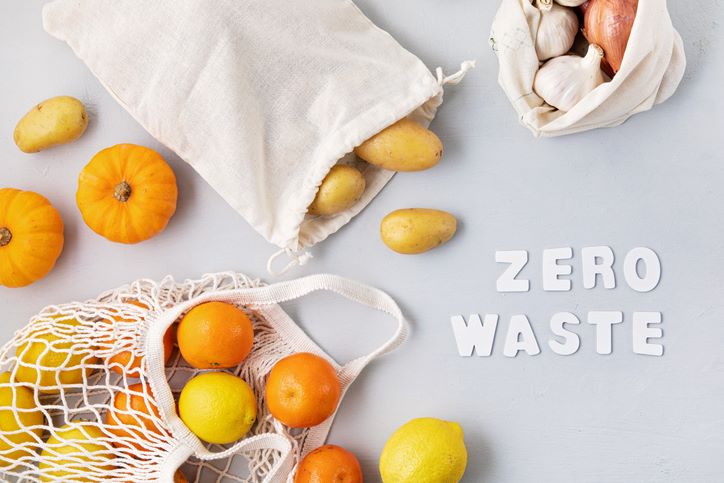
What are the Challenges to Reducing, Reusing, and Recycling in Georgia?
Lack of recycling infrastructure, accessibility to recycling opportunities, education, and fluctuating markets for recyclable items are a few areas that can create challenges.
Each one of these topics is connected and impacts the other. Organizations, companies, and individuals around Georgia are working their hardest to create a more accessible and stronger system!
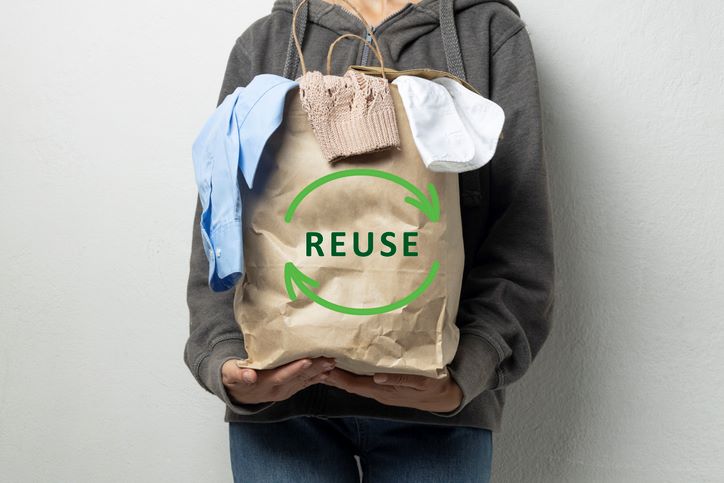
How Can I Make a Local Impact on Recycling?
When in doubt, check with your local municipality and Keep Georgia Beautiful Affiliate for ways to get involved locally through volunteer opportunities and more!
How can I help increase recycling at my place of employment? How can I help increase recycling in my community?
Check with your local Keep Georgia Beautiful Affiliate and look at the Keep America Beautiful Recycling toolkits. These local resources can help build educational awareness and create collaborative opportunities.
Is it more difficult to recycle in rural communities in Georgia?
Yes, in some rural communities, due to a lack of recycling infrastructure, it can be difficult to recycle. Always check with your local Keep Georgia Beautiful Affiliate for drop-off facilities nearby and upcoming events!
Due to the lack of infrastructure and/or funding for local municipalities’ recycling, it can cause a strain on the following aspects:
- Collection (logistics, mileage, cost comparison)
- Process (Material recovery facilities)
- Sell and transfer materials to companies to utilize materials (logistics, mileage, cost comparison)
There is more work to be done to increase access to recycling in rural communities and there are groups who have been working on this such as The Recycling Partnership with the Small Town Access Fund.
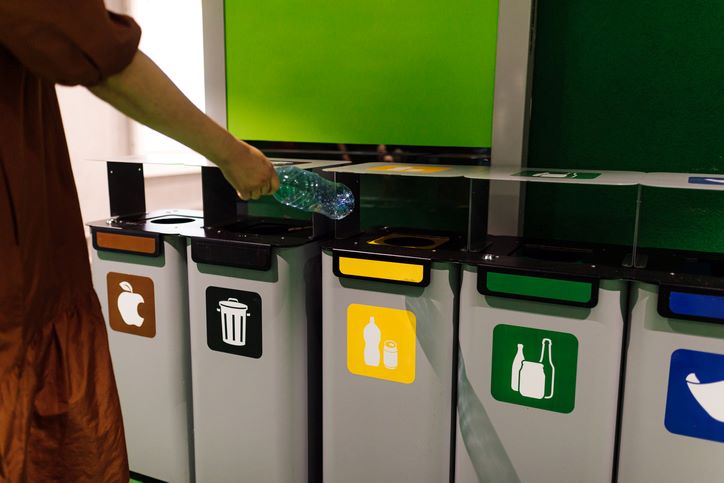
Glossary of Terms for Recycling
Carbon footprint: The total amount of greenhouse gasses (including carbon dioxide and methane) that are generated by our actions.
Circular economy: Keeps materials, products, and services in circulation for as long as possible. Reduces material use, redesigns materials, products, and services to be less resource intensive, and recaptures “waste” as a resource to manufacture new materials and products.
Composting: The decomposition of organic materials by aerobic microorganisms. Composting facilities manage the amount of moisture and oxygen and the mixture of organic materials for optimal composting conditions. The composting process emits heat, water vapor, and biogenic carbon dioxide, reducing the raw organic materials in mass and volume to create compost.
E-waste: Electronic waste (anything that requires being plugged in for electricity)
Food grade: A material that is okay to come into direct contact with food products.
Freecycle network: A grassroots and entirely nonprofit movement of people who are giving (and getting) stuff for free in their own towns and keeping good stuff out of landfills.
Food recovery: Preventing edible food from being thrown into landfills and instead being collected and distributed.
Greenhouse gas emissions: Gasses that trap heat in the atmosphere. Learn Georgia’s greenhouse gas emissions by county.
Greenwashing: When a company purposely deceives the consumer with misleading information to act as if the product is good for the environment when it is not.
Incineration: The process of burning materials.
Landfill: Modern landfills are well-engineered and managed facilities for the disposal of solid waste.
Recycling: The process of collecting and processing materials (that would otherwise be thrown away as trash) and remanufacturing them into new products.
Recycling contamination: When materials are sorted into the wrong recycling bin (placing a glass bottle into a mixed paper recycling bin for example), or when materials are not properly cleaned, such as when food residue remains on a plastic yogurt container.
Resin Identification Code (RIC): A set of symbols appearing on plastic products that identify the plastic resin out of which the product is made and an indicator of the recyclability of a material.
Single stream recycling (SSR): Also known as "fully commingled,” SSR refers to a collection system that mixes all recyclable paper fibers and cardboard, aluminum, metal, plastics #1 and #2 together in a bin placed at the curb or in a dumpster at a multifamily unit where a truck takes the material to a material recovery facility (MRF) for processing.
Sustainable material management (SMM): A systematic approach to using and reusing materials more productively over their entire life cycles. It represents a change in how our society thinks about the use of natural resources and environmental protection.
Upcycling/repurposing/creative reuse: The process of transforming by-products, waste materials, and useless or unwanted products into new materials or products perceived to be of greater quality, such as artistic value or environmental value.
Waste to Energy: Energy recovery from the process of burning municipal solid waste
Wishcycling: Putting non-recyclable items in the recycling bin with the hope it will be recycled.
Zero-waste: According to the Zero Waste International Alliance, this term refers to, “The conservation of all resources by means of responsible production, consumption, reuse, and recovery of products, packaging, and materials without burning and with no discharges to land, water, or air that threaten the environment or human health.”
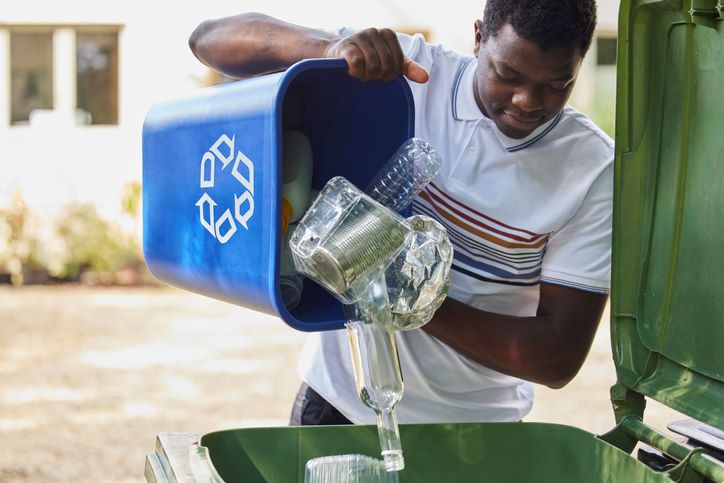
Meet Our Experts
This toolkit was written by the experts at Live Thrive.
Peggy Whitlow Ratcliffe
Founder & Executive Director
Live Thrive
Megan Reeves
Project Manager
Live Thrive


